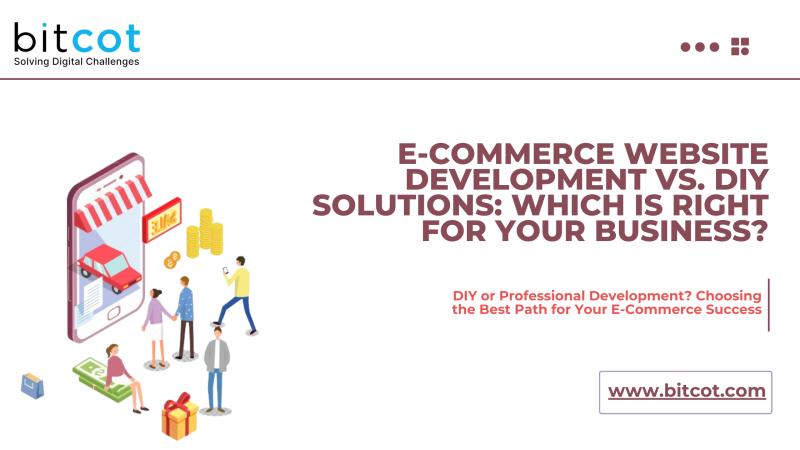E-commerce Website Development vs. DIY Solutions: Which is Right for Your Business?

Creating an e-commerce website is essential for any business looking to reach a larger audience and drive online sales. However, business owners often face a crucial decision: invest in professional e-commerce website development or go the DIY route. Each option has its pros and cons, and the right choice depends on factors such as budget, business goals, and technical expertise.
1. What Are DIY E-commerce Solutions?
Overview: DIY platforms like Shopify, Wix, and Squarespace allow business owners to create e-commerce websites without extensive technical skills.
Pros:
Cost-Effective: DIY platforms are typically cheaper upfront, offering affordable plans for small budgets.
Ease of Use: Drag-and-drop interfaces and ready-made templates make it easy for beginners to design and launch their sites.
Speed: DIY solutions enable quick setup, which is ideal for businesses looking to launch fast.
Cons:
Limited Customization: DIY platforms offer fewer customization options, which can limit branding and unique functionality.
Scalability Challenges: As your business grows, you may find it hard to scale on a DIY platform.
Potentially Higher Long-Term Costs: Costs for plugins, themes, and higher-tier plans can add up.
2. Benefits of Professional E-commerce Website Development
Tailored to Your Brand: A professional developer can create a site that fully aligns with your brand identity, offering a unique and cohesive look.
Advanced Functionality: Custom development allows for tailored features, from custom checkout experiences to advanced search and filtering options.
Scalability and Flexibility: A professionally developed site can scale with your business, adapting to new needs and supporting growth.
Optimized Performance and Security: Developers can optimize your site for faster load times, stronger security, and better user experiences.
3. Comparing DIY vs. Professional Development
Budget Considerations:
DIY: Ideal for startups or small businesses with tight budgets who need a quick, simple solution.
Professional Development: Worth the investment for businesses looking to stand out, grow, and customize extensively.
Time and Effort:
DIY: DIY platforms reduce setup time but require ongoing management and adjustments from the owner.
Professional: Developers manage setup, customization, and maintenance, saving business owners time in the long run.
Business Goals and Growth Potential:
DIY: Suitable for small, local businesses or side projects with minimal growth plans.
Professional: Ideal for growing businesses aiming to scale, improve user experience, and stand out in a competitive market.
4. When to Choose DIY Solutions
- For Small Budgets: DIY platforms are a budget-friendly solution for those just starting out.
- Simple Needs: If your business only requires basic e-commerce features, DIY may meet your needs.
- Short-Term Projects: DIY solutions can work for temporary or short-term online stores that don’t need extensive features.
5. When to Choose Professional Development
- For Unique Branding: If your brand requires a highly customized site, professional development is essential.
- Complex Requirements: Businesses with complex product offerings or a need for custom integrations benefit from a developer’s expertise.
- Growth-Oriented Businesses: If you plan to scale and expand your offerings, professional development provides the flexibility to grow.
Conclusion
Choosing between DIY solutions and professional e-commerce website development depends on your business goals, budget, and vision. DIY solutions offer affordability and ease of use, making them ideal for small or short-term projects. However, ecommerce website development in Los Angeles provides a more tailored approach, ensuring a unique, scalable, and secure site designed to grow your business. Assess your priorities carefully to make the choice that best aligns with your business needs.
Post Your Ad Here
Comments